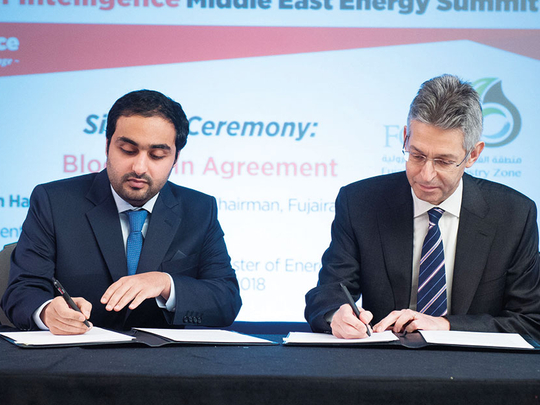
DUBAI
Fujairah Oil Industry Zone (FOIZ) has become the first commercial player in the energy sector to implement blockchain network to improve transparency, efficiency and manage risk in a secure environment.
S&P Global Platts, the independent provider of information and benchmark prices for the commodities and energy markets, is deploying the technology to provide market participants with data that is increasingly critical in the region and to the global oil markets.
The deal was signed on Thursday in London. FOIZ renewed a deal with S&P Global Platts last month to publish its commercial storage capacity data every Wednesday.
The Fujairah Data Committee, known as FEDCom, is tasked with the responsibility to collect, verify and distribute inventory data to replicate the data sets that are provided in other trading centres such as Singapore and Rotterdam.
“The technology offers FOIZ and its port operators security, together with ease of use, and a full audit trail to collate weekly inventory oil products storage data,” James Rilett, Global Innovation Director for S&P Global Platts, told Gulf News from London.
FOIZ hosts the Middle East’s largest commercial storage capacity for refined oil products such as fuel oil, middle distillates and light.
Rilett said the new solution alleviates the need for the regulator — FEDCom — to undertake manual validation and aggregation of each terminal operator’s numbers, improve the security of data transmission and storage, and reduce the scope for human error.
Built on the open source hyper ledger Fabric framework, terminal operators will submit data to FEDCom through smart contracts on individual private channels. FEDCom, in turn, runs a second smart contract, with an automatic command to calculate and submit data to S&P Global Platts on a public channel. Right now, Rilett said the validation is done manually. Over time, increased transparency of data leads to an efficient market and “we can move to a situation where more than the inventory level of the 11 terminal operators, we can keep track of the transactional process around moving inventory in and out of the terminal and it will attract more trading conditions.”
As in the current process, he said that FEDCom will have sole access to all individual terminal operator numbers and will submit only the approved aggregated weekly numbers to S&P Global Platts for global distribution.
Moreover, he said the opportunities for the energy sector to deploy Blockchain technology is the removal of manual workflow process and there is a lot of middle and back office time and man hours around reconciliation of physical documents.
According to Rilett, the commodity markets have been at the forefront of technology “but interoperability is very important and in some ways a big challenge. The biggest challenge will continue to be around the legal possibility of technology deployment.”
He added: “As part of our ongoing commitment to digital transformation in the energy sector, we are excited about the opportunity to engage with market participants to discuss ways of deploying this technology more broadly.”












